- Learning time
- 10 minutes
- First play time
- 45 minutes
La Strada
Designed by: Martin Wallace
La Strada is a game of route-building, with players representing merchants establishing trade networks across the land by building roads. At the start of the game, the board is populated with tiles representing cities, towns, villages and hamlets. Each player takes their colour of road tiles, merchants (in the form of cubes) and a shield which tracks the cash at your disposal.
Turns are ingeniously simple. At the start of every turn you receive 6 cash, which is tracked on the board using your shield. You can have up to ten cash at most, so it’s possible to save some back for future turns. Then you spend it – or some of it.
Everyone starts with a workshop tile that represents the seed of their network: using your road tiles, you build outwards from here, paying cash for each tile you place (2, 3 or 4 depending on the terrain: plains, forest or hills) and connecting to a settlement. When you reach the settlement, you place a merchant there to show you’re part of its commerce, and merchants of different players can occupy the same settlements. This continues until someone is unable to make a further connection: because they don’t have the tiles they need, or enough cash, they’re blocked off from building or all their merchants have been placed.
Then the merchants score, which is not so much a sting in the tail of La Strada as its dark, capitalist heart: all merchants can (in theory) harvest gold (ie score points), but how much depends on two things: the size of the settlement they’re in, and how many other merchants occupy it as well: cities have room for everyone, but a single merchant there will make far more money than four. A hamlet can sustain just two merchants; if more occupy it, nobody gets anything. Thus La Strada is often not so much about maximising your own returns as minimising others, with options aplenty to play spoiler!
The two-player game is markedly different, with no sharing of settlements, and is not an experience we’d recommend.
The guru's verdict
-
Take That!
Take That!
Plenty. If the early turns seem to offer the freedom of the land, you'll quickly find the bucolic valleys filling up with profit-minded highways!
-
Fidget Factor!
Fidget Factor!
Low. You basically want to get your merchants out to the best spots, and try to hamper other players into the bargain.
-
Brain Burn!
Brain Burn!
Low, but not a game that 'plays itself' by any means. You have a lot of agency, but narrowing parameters of implementation.
-
Again Again!
Again Again!
As long as players are okay with an experience that borders on a rug-pulling party, La Strada's random set-up is enough to make each play feel distinct in its micro-aggressions, if not the overall sense of a half-hour pillow fight.


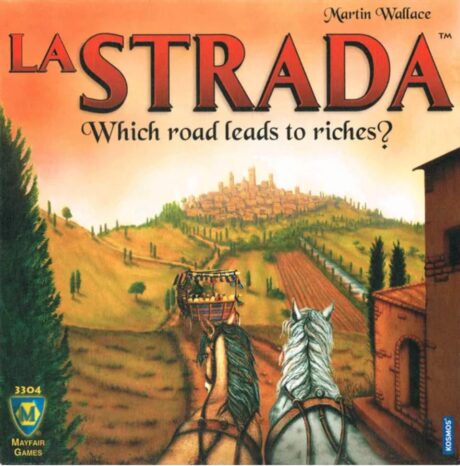
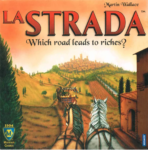
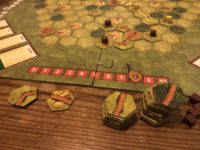
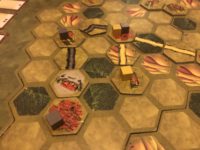
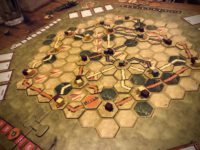
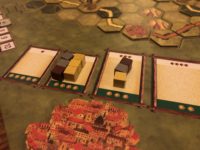
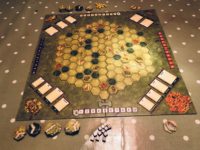

Sam says
We're giving La Strada three stars because even though the board colours are muted, the merchant colours problematic for colour-blind players, and the 2-player version not really worthy of the name, the combination of simple rules and high interactivity is always a winner with us. Players can build roads out of a settlement they occupy (if there's room!) but can't build through opponent's roads. So as well as the combative nature of the scoring, there's a slightly gladiatorial aspect to the route-building too. If La Strada shows its age in the aesthetics, there's something appealing about the experience it offers: fast, spicy, almost brutal!